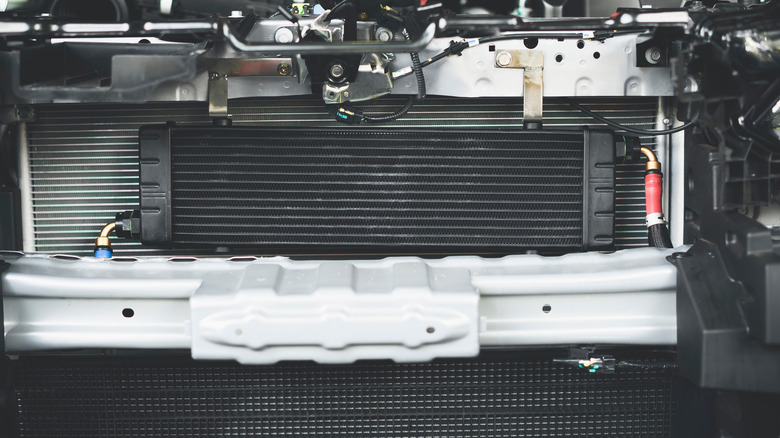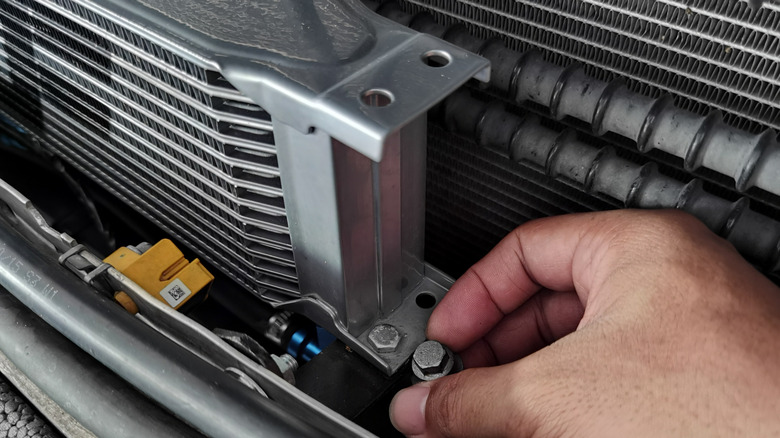Do You Really Need An Oil Cooler For Your Car?
The answer to whether your car needs an oil cooler will depend on multiple variables. Excess heat, such as when an engine overheats, can easily damage or kill any gasoline or diesel engine. It's why every driver should know what to do the moment the temperature gauge spikes dangerously to the H (hot) zone, as neglecting an overheating engine means expensive repair bills at the shop. However, all engines produce heat, and maintaining a steady operating temperature is critical to efficiency, responsiveness, and outright performance.
It's why car manufacturers design the cooling system of cars to allow the engine to heat up effectively without overheating and causing damage. It does it by circulating coolant inside the engine using pumps, radiators, fans, and thermostats. It also means that your typical compact or midsize sedan has optimized cooling systems that can keep the engine cool or maintain the ideal operating temperature, even in blazing hot summer traffic.
Generally, with a stock engine, a cooler isn't necessary. Adding an auxiliary oil cooler might interfere with the heat balance and cause the engine to run cooler than usual, depending on the application. Just as an overheating engine is inefficient, a similar issue arises when the engine is running colder than usual. Colder oil will not flow as readily as hot oil and cause more friction, wear, and tear.
What is an oil cooler?
An oil cooler is exactly what it sounds like: it removes excess heat from the oil that lubricates the car's engine and machinery. It resembles a smaller or more compact radiator, and there are air-cooled or water-cooled oil coolers, depending on the application. It works by drawing hot oil from the engine and passing the fluid through the cooler, where the heat from the oil exchanges with the surrounding air. It's why some refer to an oil cooler as a heat exchanger. Installing one is one of the few ways to keep any engine running cool when the mercury rises.
The oil inside an engine performs several functions, one of which is absorbing heat. The engine pumps oil on the bearings, gears, lifters, pistons, connecting rods, camshaft, and crankshaft to clean, lubricate, and remove heat from moving parts. The average oil temperature is 194 to 230°F (90 to 110°C), but sports cars with high-performance engines and workhorse diesel trucks can operate at slightly higher temperatures than the average car.
The oil cooler's job is to reduce the fluid temperature to the recommended level. By doing so, it also helps extend the operating life of the liquid, which in turn reduces operating costs and possible downtime due to mechanical failure.
When to install an oil cooler
Your car won't need an oil cooler if the engine is stock or unmodified. Moreover, an oil cooler would be overkill for a daily-driven car. However, things change if you modify the engine to produce more power or if you like doing track days with the gang. More power means more heat, and racing requires the engine to stay at higher revs to keep up, which also produces more heat.
The factory cooling system may fall short in such extreme scenarios, so installing an oil cooler will prevent oil degradation when the going gets tough, thereby prolonging the engine's life and preventing heat soak from ruining the fun. An oil cooler can be beneficial if you live in a hot climate and frequently engage in activities such as towing, hauling, or off-roading. The good news is that modern trucks (particularly those equipped with diesel engines) will most likely have a standard oil cooler from the factory. Moreover, heavy-duty trucks have more robust cooling systems.
Installing a transmission oil cooler is also an excellent idea. Like the oil inside an engine, the automatic transmission fluid (ATF) cleans, lubricates, and removes excess heat. But unlike engine oil, which requires draining and replenishing every 5,000 to 8,000 miles, most carmakers recommend flushing the ATF every 60,000 or 80,000 miles. If not, premature wear and tear is inevitable. A transmission oil cooler will help extend the life of the ATF and the gearbox, in general.


